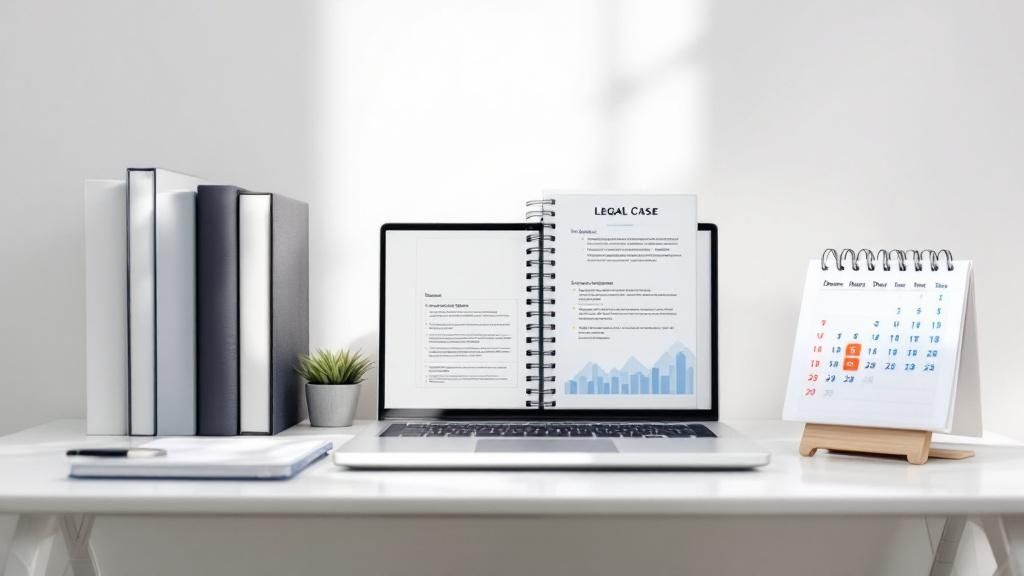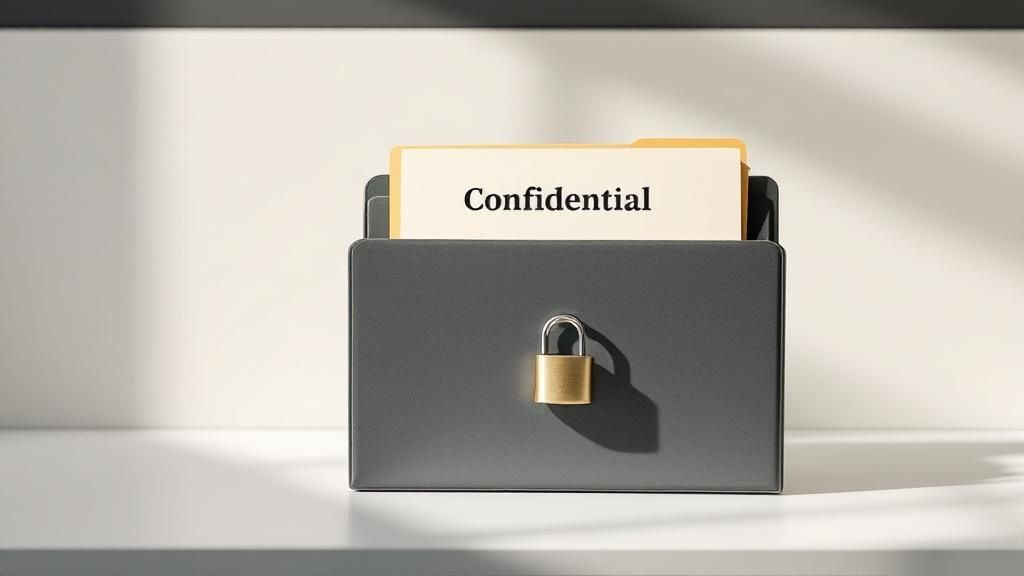
 24 minutes read
24 minutes read
Let's be real. Most interview guides are garbage. They’re stuffed with generic questions that get you rehearsed, useless answers. You spend an hour on Zoom, hang up, and still have no clue if the candidate can actually do the job. I've been there. I’ve hired, and yes, fired, more legal support staff than I care to admit. The difference between a legal assistant who sinks your firm and one who helps it soar often comes down to asking the right legal assistant interview questions from the get-go.
Hope you enjoy spending your afternoons fact-checking resumes and re-doing shoddy document formatting, because that’s your future if you get this wrong. A bad hire in a legal support role doesn't just cost money; it costs you billable hours, credibility with clients, and your own sanity. So this isn't another generic list. We’re dissecting the why behind each question, giving you the exact framework to separate the talkers from the doers.
This is the list I wish I had when I was building my first legal team. It's a battle-tested roadmap to identify a truly exceptional legal assistant who can handle the pressure, manage complex tasks, and protect your firm's most sensitive information. Forget the fluff. It's time to find a hire who won't make you want to mortgage the office ping-pong table just to cover their mistakes. Let's get started.
Let’s get straight to it. This isn't a warm-up; it's the main event. When a hiring manager asks this, they’re not just checking a box. They’re trying to figure out if you can do the job without constant hand-holding. They want to know if you're the kind of legal assistant who can dive into a complex case file and bring order to chaos, or if you'll be the one creating it.

This question separates the career professionals from the resume-padders. An attorney’s time is their most valuable asset, and your ability to conduct efficient research and flawlessly manage cases directly protects that asset. They need someone who can independently find a specific precedent on Westlaw, manage a discovery production in Clio, and keep track of a dozen deadlines without breaking a sweat.
When they pose this question, they're digging into several key areas:
Avoid a generic "I'm very organized and have experience with research." Instead, use the S.T.A.R. Method (Situation, Task, Action, Result) to build a compelling narrative.
This answer doesn't just list skills; it proves your value. It shows you understand the why behind the tasks and can connect your work to successful case outcomes. If you're looking to sharpen these specific skills, you might find valuable insights into what top firms demand by exploring how to hire dedicated legal researchers. It’s a great way to see what the market values most right now.
Welcome to the stress test. This question isn't about whether you can juggle; it's about whether you can do it without dropping a single ball when the entire firm is on fire. A legal environment is a constant stream of competing priorities, last-minute filings, and urgent attorney requests. They need to know you won't crumble when two partners give you "top priority" tasks at the same time.

Your answer here reveals your entire professional operating system. It shows whether you’re proactive or reactive, strategic or chaotic. A great legal assistant is the firm's air traffic controller, safely landing every project on time. A bad one is the reason for missed deadlines and malpractice claims. They want the controller.
When they ask about prioritization, they’re digging for proof of your:
Ditch the vague "I'm good under pressure and just work hard." Instead, detail your system. Use the S.T.A.R. Method (Situation, Task, Action, Result) to paint a clear picture of your competence.
This response proves you have a repeatable, logical system. It shows you can think critically, manage expectations, and use tools to maintain control. Firms invest heavily in a structured approach, and showing you align with that mindset is key. You can see how critical these systems are by learning more about what firms look for when they hire dedicated legal case managers. Your answer should prove you already think like one.
If legal research is the engine, document preparation is the chassis that holds the entire case together. A single formatting error in a pleading can get it rejected by the court clerk, derailing a deadline and making the firm look amateurish. This question is designed to see if you sweat the small stuff, because in law, the small stuff is often the whole game.

They aren't just asking if you know how to use Microsoft Word. They’re asking if you understand the hyper-specific, often arcane, rules that govern legal documents. Can you create a perfectly formatted motion that complies with local court rules, draft an ironclad contract template, and shell discovery requests without needing your hand held? A legal assistant who can do this is invaluable; one who can’t is a liability.
Behind this seemingly straightforward question, the hiring manager wants to uncover a few critical competencies:
Ditch the generic "I'm proficient in document preparation." That tells them nothing. Instead, provide concrete proof using the S.T.A.R. Method (Situation, Task, Action, Result).
This answer proves you’re not just a typist; you’re a proactive problem-solver who understands procedure and adds tangible value. Demonstrating this level of competence is key when firms are looking to hire legal assistants who can integrate seamlessly and contribute from day one.
This question isn't just about whether you can keep a secret. It's a non-negotiable, foundational test of your understanding of the legal profession. A single breach of confidentiality can lead to malpractice claims, disbarment for the attorney, and the absolute implosion of a firm's reputation. They’re asking if you are a potential asset or a walking liability.

Think of it this way: the firm is a vault, and you're being interviewed for a key. From sensitive divorce details and criminal case strategies to confidential business transactions worth millions, you'll be handling information that could ruin lives or sink companies if it got out. They need to know, without a shadow of a doubt, that you understand the gravity of that responsibility and have the discipline to uphold it.
When they ask about confidentiality, they are probing for several critical competencies:
Don't just say, "I'm very trustworthy." Prove it with a clear, protocol-driven answer. The S.T.A.R. Method (Situation, Task, Action, Result) is perfect for demonstrating your practical application of these principles.
This answer shows you don’t just understand the rule; you’ve built a system around it. It demonstrates foresight, discipline, and a deep respect for the ethical backbone of the legal profession.
If case management is the engine of a law firm, billing is the fuel. This question isn't just about data entry; it’s about your understanding of the firm's business model. A mistake in a filing can be fixed, but a mistake in a client invoice can permanently damage a relationship and choke the firm’s cash flow. They need to know you get it.
This is one of those critical legal assistant interview questions that reveals whether you see yourself as just a task-doer or as an integral part of the business operation. An attorney who has to chase down your time entries or explain a botched invoice to an angry client is an attorney who is losing money. They're looking for someone who can handle the financial and interpersonal side of the practice with precision and professionalism.
When they ask about billing and client management, they're probing for several core competencies:
Steer clear of a simple "I've used billing software before." Instead, provide a concrete example that demonstrates your impact on both the firm's finances and its client relationships. The S.T.A.R. Method is perfect for this.
This kind of answer proves you’re not just a timekeeper. It shows you're a strategic partner who understands how accurate billing and proactive client communication contribute directly to the firm’s health and reputation.
The law isn't static, and neither are court rules. They change constantly. When a hiring manager asks this, they're testing your professional initiative. Are you a passive employee who waits to be told about a new e-filing requirement, or are you a proactive professional who anticipates these shifts and prepares the team for them?
This question is a litmus test for commitment. A candidate who just shows up to collect a paycheck won't bother staying current. But a true legal professional understands that outdated knowledge isn't just embarrassing, it's malpractice waiting to happen. They need someone who actively protects the firm from procedural missteps and demonstrates a genuine passion for the legal field.
This isn't just about what you read; it's about your mindset. They are probing several key qualities:
Avoid a vague answer like, "I read legal news online." That’s what everyone says. Instead, be specific and demonstrate a clear strategy for your professional development. Show them you have a system.
This answer proves you’re not just a passive recipient of information. It positions you as a valuable, forward-thinking member of the team who actively safeguards the firm’s efficiency and reputation.
Welcome to the personality test. This question isn’t about your technical skills; it’s about your emotional intelligence and whether you’ll implode under pressure. Law firms are high-stress environments, and difficult personalities aren't the exception; they're part of the landscape. They need to know if you’re the calm center of the storm or just another gust of wind adding to the chaos.
This is one of those behavioral legal assistant interview questions that reveals more than you think. A bad answer can paint you as a complainer, a gossip, or someone who lacks professional maturity. A great answer shows you can navigate conflict, manage expectations, and maintain composure when a client is panicking or an attorney is having a tough day. They’re betting on your ability to de-escalate, not detonate.
When they ask this, they’re probing for a few critical traits:
This is another perfect opportunity to use the S.T.A.R. Method (Situation, Task, Action, Result). The key here is to keep the focus on your actions and professionalism, not on the other person's faults.
This answer showcases your emotional intelligence and proactive problem-solving. It proves you can handle difficult dynamics with grace and strategic thinking, turning a potential conflict into an efficiency win.
| Question Topic | Implementation Complexity 🔄 | Resource Requirements ⚡ | Expected Outcomes 📊 | Ideal Use Cases 💡 | Key Advantages ⭐ |
|---|---|---|---|---|---|
| Tell me about your experience with legal research and case management | Medium – requires database and organizational skills | Moderate – legal databases, case tools | Demonstrates technical and organizational ability | Candidates with prior legal research and case handling experience | Reveals practical skills and independence |
| How do you prioritize tasks when working under tight deadlines? | Low to Medium – relies on behavioral responses | Low – no tools needed, mostly experience | Shows time management and decision-making under pressure | Assessing candidates' stress handling and prioritization | Reveals problem-solving and stress management |
| Describe your experience with legal document preparation and formatting | Medium – requires technical formatting knowledge | Moderate – document templates, court rules | Assesses attention to detail and legal formatting skills | Positions needing strong document drafting skills | Demonstrates quality control and legal formalities |
| How do you maintain confidentiality and handle sensitive information? | Low – ethical understanding needed | Low – knowledge and discretion | Evaluates ethical awareness and discretion | Roles requiring strict confidentiality and ethics | Highlights integrity and professional responsibility |
| What experience do you have with legal billing and client management? | Medium – requires software and communication skills | Moderate – billing software and client contact tools | Shows understanding of firm operations and client relations | Positions involving billing and client management | Demonstrates business acumen and client orientation |
| How do you stay current with changes in laws and legal procedures? | Low – self-directed learning | Low – subscriptions, associations | Indicates commitment to professional growth | Long-term career-oriented roles | Reveals dedication to continuous learning |
| Describe a time when you had to work with a difficult client or attorney | Low – behavioral story sharing | Low – no specific resources | Shows interpersonal and conflict resolution skills | Assessing emotional intelligence and professionalism | Reveals adaptability and communication skills |
So, there you have it. A veritable buffet of legal assistant interview questions designed to separate the true professionals from the pretenders. We’ve dissected everything from prioritizing tasks under pressure to handling a disgruntled partner who just discovered the office is out of their favorite brand of coffee.
But let’s be honest. Asking these questions is only half the battle. You can have the most brilliant, insightful list of legal assistant interview questions in the world, but they’re useless if you’re asking them to the wrong people. The real challenge isn’t just identifying talent; it's getting talent in the door in the first place.
The ultimate goal of any interview is to get past the canned, pre-rehearsed answers. You’re not just listening for keywords like "e-discovery" or "case management software." You're listening for the how and the why behind their experiences.
A great candidate won't just tell you they’re organized. They’ll describe the color-coded, multi-tabbed, cross-referenced digital and physical filing system they built from scratch at their last firm. They won’t just say they can handle confidentiality; they’ll detail the specific protocols they followed for redacting documents and securing client data, maybe even catching a potential breach before it happened.

Key Insight: The best answers are stories, not statements. Look for candidates who can provide concrete examples with specific outcomes. A story demonstrates experience; a statement just claims it.
Let’s talk brass tacks. The old-school hiring method is a time-suck and a money pit. You post a job on a generic board, cross your fingers, and prepare for the resume avalanche. Hope you enjoy spending your afternoons fact-checking resumes and running screening calls, because that’s now your full-time job.
This outdated process forces you to become a professional resume-sifter. You waste billable hours on interviews that go nowhere, all while the essential work piles up. A single bad hire can set you back thousands in lost productivity, recruiting fees, and training costs. It's a gamble, and the house usually wins.
Once the interviews are done, your work isn’t over. Now comes the crucial synthesis phase. Don't just rely on a gut feeling.
Mastering your approach to legal assistant interview questions is more than just a hiring tactic; it’s a strategic advantage. It ensures you’re building a team that is not just competent, but resilient, proactive, and ready to contribute from day one. Stop hiring for scripts and start hiring for skill. Your practice, your clients, and your own sanity will thank you for it.
Tired of sifting through unqualified candidates to find someone worth interviewing? At HireParalegals, we do the heavy lifting for you with our rigorous four-step vetting process, so you only speak with top-tier, remote-ready legal professionals. Skip the gamble and connect directly with the talent you need at HireParalegals.